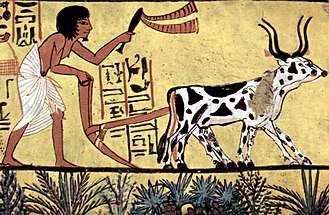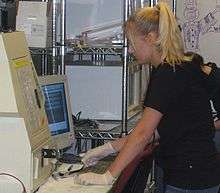Agronomy
Agronomy is the science and technology of producing and using plants in agriculture for food, fuel, fiber, and land restoration. It is both a humanitarian career and a scientific one. Agronomy has come to encompass work in the areas of plant genetics, plant physiology, meteorology, and soil science. It is the application of a combination of sciences like biology, chemistry, economics, ecology, earth science, and genetics. Agronomists of today are involved with many issues, including producing food, creating healthier food, managing the environmental impact of agriculture, distribution of agriculture, and extracting energy from plants.[1] Agronomists often specialise in areas such as crop rotation, irrigation and drainage, plant breeding, plant physiology, soil classification, soil fertility, weed control, and insect and pest control.
| Agriculture |
|---|
 |
|
Categories
|
|
|
 An agronomist measures and records corn growth and other processes. | |
| Occupation | |
|---|---|
| Names | agronomist agricultural scientist crop scientist |
Occupation type | profession |
Activity sectors | agriculture, agronomy |
| Description | |
| Competencies | technical knowledge, sense of analysis |
Fields of employment | food industry, science, research and development |
Related jobs | see related disciplines |
Plant breeding

This area of agronomy involves selective breeding of plants to produce the best crops under various conditions. Plant breeding has increased crop yields and has improved the nutritional value of numerous crops, including corn, soybeans, and wheat. It has also led to the development of new types of plants. For example, a hybrid grain called triticale was produced by crossbreeding rye and wheat. Triticale contains more usable protein than does either rye or wheat. Agronomy has also been instrumental in fruit and vegetable production research.
Biotechnology
.jpg)

Agronomists use biotechnology to extend and expedite the development of desired characteristic.[2] Biotechnology is often a lab activity requiring field testing of the new crop varieties that are developed.
In addition to increasing crop yields agronomic biotechnology is increasingly being applied for novel uses other than food. For example, oilseed is at present used mainly for margarine and other food oils, but it can be modified to produce fatty acids for detergents, substitute fuels and petrochemicals.
Soil science
Agronomists study sustainable ways to make soils more productive and profitable throughout the world. They classify soils and analyze them to determine whether they contain nutrients vital to plant growth. Common macronutrients analyzed include compounds of nitrogen, phosphorus, potassium, calcium, magnesium, and sulfur. Soil is also assessed for several micronutrients, like zinc and boron. The percentage of organic matter, Soil pH, and nutrient holding capacity (cation exchange capacity) are tested in a regional laboratory. Agronomists will interpret these lab reports and make recommendations to balance soil nutrients for optimal plant growth.[3]
Soil conservation
In addition, agronomists develop methods to preserve the soil and to decrease the effects of erosion by wind and water. For example, a technique called contour plowing may be used to prevent soil erosion and conserve rainfall. Researchers in agronomy also seek ways to use the soil more effectively in solving other problems. Such problems include the disposal of human and animal manure, water pollution, and pesticide build-up in the soil. As well as looking after the soil for future generations to come, such as the burning of paddocks after crop production. Pasture management techniques include no-till farming, planting of soil-binding grasses along contours on steep slopes, and using contour drains of depths up to 1 metre.[4]
Agroecology
Agroecology is the management of agricultural systems with an emphasis on ecological and environmental perspectives.[5] This area is closely associated with work in the areas of sustainable agriculture, organic farming, and alternative food systems and the development of alternative cropping systems.
Theoretical modeling
Theoretical production ecology tries to quantitatively study the growth of crops. The plant is treated as a kind of biological factory, which processes light, carbon dioxide, water, and nutrients into harvestable products. The main parameters considered are temperature, sunlight, standing crop biomass, plant production distribution, and nutrient and water supply.
See also
References
- "I'm An Agronomist!". Imanagronomist.net. Retrieved 2013-05-02.
- Georgetown International Environmental Law Review
- Hoeft, Robert G. (2000). Modern Corn and Soybean Production. MCSP Publications. pp. 107 to 171. ASIN B0006RLD8U.
- Arya, R. L.; Arya, S.; Arya, Renu; Kumar, J. (2015-01-01). Fundamentals of Agriculture (ICAR-NET, JRF, SRF, CSIR-NET, UPSC & IFS). Scientific Publishers. ISBN 978-93-86102-36-2.
- "Iowa State University: Undergraduate Program - Agroecology". Archived from the original on 7 October 2008.
Bibliography
- Wendy B. Murphy, The Future World of Agriculture, Watts, 1984.
- Antonio Saltini, Storia delle scienze agrarie, 4 vols, Bologna 1984–89, ISBN 88-206-2412-5, ISBN 88-206-2413-3, ISBN 88-206-2414-1, ISBN 88-206-2415-X
External links
| Look up agronomist in Wiktionary, the free dictionary. |
| Wikimedia Commons has media related to Agronomy. |
| Wikiquote has quotations related to: Agronomy |
| At Wikiversity, you can learn more and teach others about Agronomy at the Department of Agronomy |